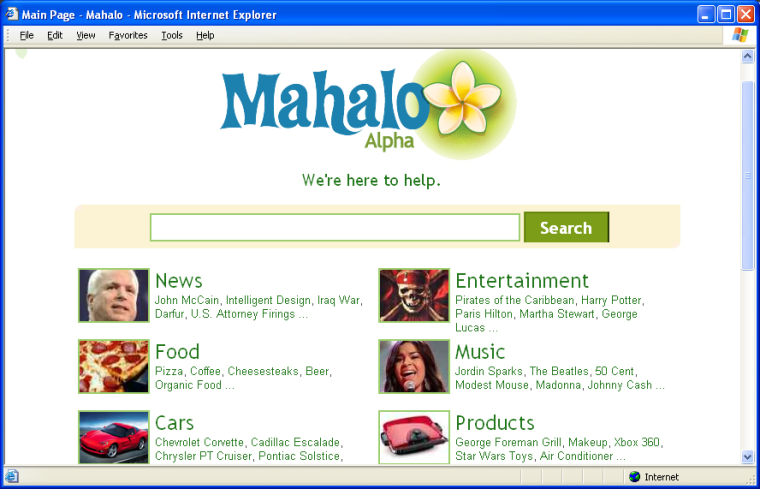While the Internet's major search engines keep adding more computers to scan the Web and run increasingly sophisticated algorithms to pull up meaningful results, dot-com luminary Jason Calacanis thinks there's still a place for people power.
Backed by a group of investors with impressive track records, Calacanis is putting his theory to the test with Mahalo.com — a stripped-down search engine geared to handle the most popular requests in widely appealing categories like travel, music, television, movies, cars, food, health, news and sports.
Mahalo, which Calacanis unveiled Wednesday at a technology conference in Southern California, relies on about 40 employees to track down the best responses to some of the Web's most repeated requests. The findings are boiled down to a series of lists pointing to the most helpful Web sites.
High-octane search engines like Google Inc. and Yahoo Inc. strive to point their visitors in the right direction too, but Calacanis believes their results are littered with too many irrelevant sites because marketing consultants and mischief makers have learned how to trick the machine-driven algorithms.
"When we have the results (to a query), it's going to be 10 times better than Google or Yahoo," Calacanis boasted during a recent preview of Mahalo for The Associated Press.
Like Google and Yahoo, Mahalo hopes to eventually make money from selling ads alongside its search results, although Calacanis says he already has secured enough financing to last four or five years without turning a profit. He declined to provide how much money he has raised.
Mahalo — the Hawaiian phrase for "you're welcome" — is starting with just 4,000 Web pages, or lists. Although Calacanis hopes to add about 500 additional pages per week, Mahalo's size will never approach the breadth of Google or Yahoo, which index billions of Web pages. Mahalo is aiming to address the Web's 10,000 most popular search terms.
Calacanis, 36, is well known among technophiles. His most recent claim to fame came as co-founder of Weblogs Inc., a blogging network sold to AOL in late 2005 for a reported $25 million.
In the early days of New York's dot-com boom, Calacanis created a stir with the Silicon Alley Reporter, which morphed from a small newsletter to a trendy magazine before falling on hard times and eventually shifting its focus to venture capital.
His latest idea of using human editors to identify the Internet's best content isn't new.
In some ways, Mahalo harks back to 1994 when two Stanford University graduate students began compiling "Jerry's and David's Guide to the World Wide Web." The directory became so popular that the Stanford students, Jerry Yang and David Filo, decided to found Yahoo, which quickly embraced computer-powered algorithms because the Web became too large for humans to index efficiently and accurately.
Others, like About.com and the Open Directory Project, have tried to tackle Internet search with a more human touch with limited success.
But Calacanis believes it's an ideal time for a directory-style search engine because his team of expert "guides" can draw upon so many free resources already available on the Web. Besides Google, Yahoo and other mass-market search engines like Microsoft Corp.'s MSN and IAC/InterActiveCorp.'s Ask.com, a wide array of specialty search tools focus on everything from blogs to pictures.
"Every innovation that Google comes up with becomes another tool for us to move up the stack," Calacanis said. "We are standing on the shoulders of giants."
That probably won't be enough to elevate Mahalo, predicted Jim Lanzone, Ask.com's chief executive.
"Just like a lot of people who watch movies think they can be scriptwriters, there are a lot of people who use search engines who think they can build a search engine," Lanzone said. "Until you are on the other side of the wall, you will never understand just how difficult it is. On any given day, 60 percent of the search requests we get, we have never seen before."
Several successful businessmen are betting on Calacanis.
Mahalo's list of investors includes: Sequoia Capital's Michael Moritz, who backed both Yahoo and Google; Dallas Mavericks owner Mark Cuban, who became a billionaire after selling Broadcast.com to Yahoo during the dot-com boom; AOL Vice Chairman Ted Leonsis, who also owns the National Hockey League's Washington Capitals; and Elon Musk, co-founder of online payment service PayPal Inc.
